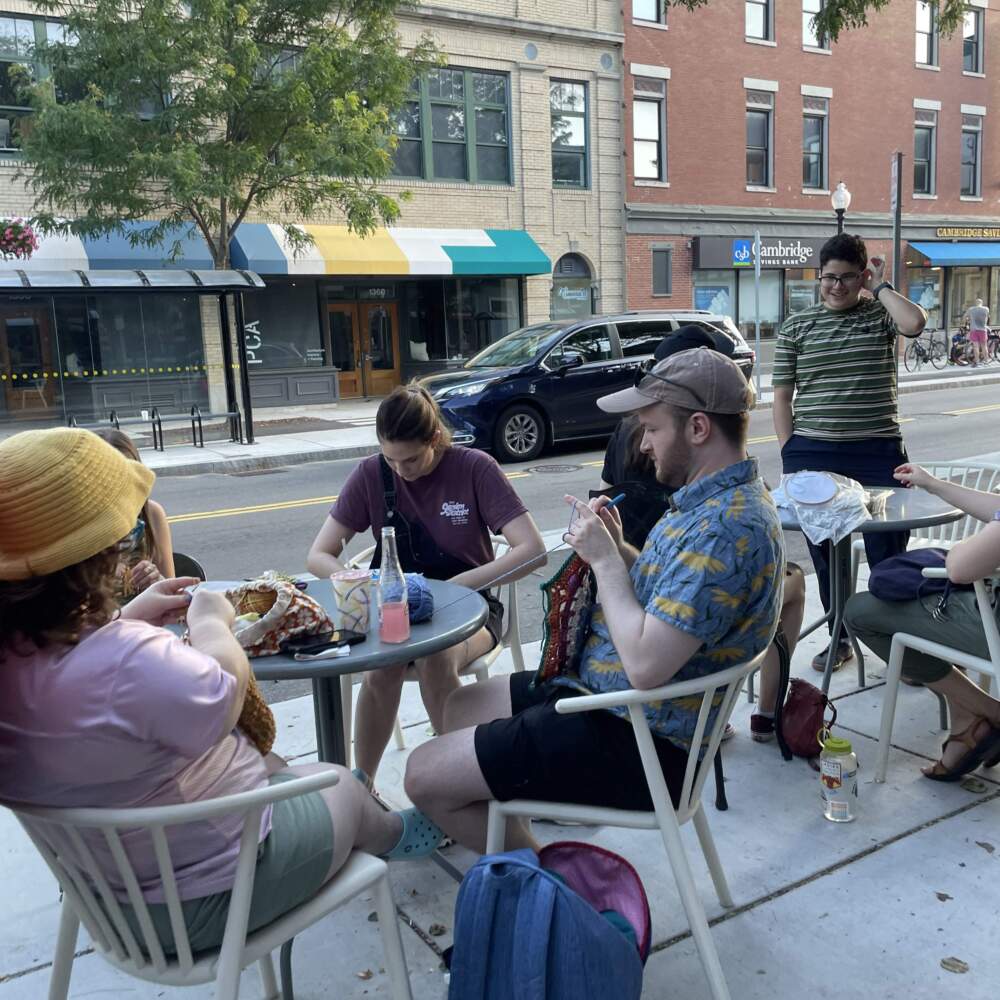Advertisement
The Weekender: Boston's Saturday Morning Newsletter
Want to learn to knit or crochet? Here are some purls of wisdom from two local yarn store owners

Editor's Note: This is an excerpt from WBUR's Saturday morning newsletter, The Weekender. If you like what you read and want it in your inbox, sign up here.
It’s been unseasonably warm the last couple weeks in Boston. But the summery weather isn’t fooling me. Chillier days — and the numerous holiday events that come with them — are right around the corner.
Maybe you’re looking for a way to pass these long, dark nights. Or perhaps, a way to DIY your own cozy winter gear. If either statement is true for you, picking up a fiber craft like knitting or crochet might be a good way to make the most of the season ahead.
But don’t take it from me (I’m a bit biased). I chatted with the owners of two local yarn stores to get the knitty gritty on stitching for everyone from wannabe knitters and beginners to last-minute-gift makers.
Isn’t knitting for grandmas?
Fibercraft has long been associated with women. But during the pandemic, yarn store owners said they saw a sudden boom in the number of people across ages and genders picking up crafty hobbies.

“Folks found themselves at home and were looking to try something new, and so we saw an uptick in people who were looking to learn to knit, crochet and embroider,” said Virginia Johnson, owner of Gather Here in Cambridge. (Felting, sewing, weaving and cross-stitch are also popular fiber crafts.)
Both Sara Ingle, owner of Boston Fiber Company in the SoWa District, and Johnson say the ages of attendees at their stores’ classes and craft-alongs range from 20 to over 70.
“There’s a huge benefit to skill-sharing and learning these skills cross-generationally,” said Johnson.
Finding your craft circle
Groups are great place for beginners to receive hands-on direction when your knits accidentally turn into knots. And going to a craft circle provides a social element to what is usually a solo hobby.
Gather Here offers a full calendar of instructional classes and free craft nights. And Boston Fiber Company hosts a free “coffee and crafting” group every Sunday afternoon and a “sip and stitch” group every second and fourth Friday of the month. Stitch House in Dorchester (which happens to be owned by avid crafter and former Boston City Councillor Annissa Essaibi George) also hosts a social knitting event on the first Sunday of every month.
Fancy a craft brew to go with your fiber craft? Ingle suggests checking out Boston Drunken Knit Wits or Boston Queer Fiber Arts, who meet up at breweries in Boston and Somerville. Whichever you choose, “everyone’s so welcoming because there’s a shared hobby,” said Ingle.
Picking a project
Once you have found your fellow knit-wits, it’s time to get hooked on a project.
“I tell people all the time that everyone is a maker, you just have to tap into what that thing is you want to make,” said Johnson. She said sometimes it takes a little “speed dating” to figure out what you’ll enjoy making — and eventually finish.
“I think crochet appeals to a younger crowd, since it’s a quicker pickup,” said Ingle. Crochet only requires one hook (which is a little less complicated than knitting, where you hold a needle in each hand). You’ll also want to buy a less expensive yarn to start, she added.
Johnson suggests picking up cheap materials for your first project at Make & Mend in Somerville’s Union Square. “They’re an arts and crafts thrift store and you can find all kinds of yarn and needles for very low prices, and they do a good job of making sure things are in good condition,” she added.
Advertisement
Scarves are an easy beginner project, says Ingle. But you should also keep in mind that, depending on the length of your scarf, it may take a while to complete.
“Pick something you think you can get done,” said Ingle. “You can make a hat pretty easily as your first project as a crocheter. We suggest beginners go with fingerless gloves, too, which is essentially just a square with a seam up the side.”
Before you begin, there’s one important thing to remember that doesn’t involve materials: Let go of your personal expectations.
“We as adults can feel so much pressure to know how to do something. And as we grow older, it becomes even more intimidating,” said Johnson. “We can be worried about not picking it up right away or looking foolish. My motto is ‘process over perfection.'”
“Anybody can do it. But your first project isn’t going to be good — and that’s okay,” Ingle added.
So, cheers to learning something new, and the imperfections that come with that effort.
P.S. — I get it. Letting go of your expectations is easier said than done. If you need an extra boost, check out this piece from NPR’s Life Kit on how to set yourself up for success as you take on any new challenge.
